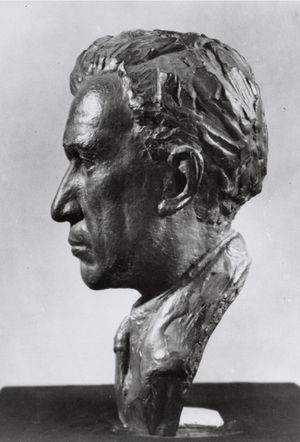B. H. M. Vlekke
( academic) | |
|---|---|
 Bust of Vlekke | |
| Born | 1899 |
| Died | 1970 (Age 70) |
| Nationality | Dutch |
| Alma mater | Roman Catholic University in Nijmegen |
Dutch academic who did propaganda work when in exile in the United States during WW2. In attendance at the first Bilderberg 1954. | |
Dr Bernard H. M. Vlekke was a Dutch academic. He was in exile in the United States during World War 2, where he did propaganda work for the Dutch exile government. After the war he was Secretary-General of the Netherlands Society for International Affairs, and was in attendance at the first Bilderberg in 1954.[1]
Career
In 1937 Vlekke was appointed secretary of the Netherlands Institute for historical and art historical research in Rome. He left Italy in June 1940, and traveled with his wife to the United States. where he was not only employed as an employee of the newly founded Nederlandsch Informatie Bureau in New York, but also at Harvard University.[1]
From a scientific point of view his American years were also very productive, especially through publications that could familiarize the American public with Dutch history. After Nusantara. A history of the East Indian Archipelago (Cambridge, Mass., 1943), he published Evolution of the Dutch Nation (New York, 1945) and The Netherlands and the United States (Boston, 1945)
When Vlekke wanted to return to liberated Rome in 1944, his old boss opposed this after a personality clash. His dismissal as secretary in early 1946 for incompatibility was extremely grievous to him, and understandably he thereafter pursued rehabilitation by trying to find an academic position.[1]
Netherlands Society for International Affairs
Finally on October 1, 1947, he was appointed head of the Publications and Research Department of the Netherlands Society for International Affairs (NGIZ), founded in 1946, of which Vlekke was secretary-general from May 1948 to September 1964, and editor-in-chief of the magazine Internationale Spectator. In his work, East-West relations were treated in a businesslike manner with historical analyzes, and not the Cold War paranoia of communism that prevailed in the late 1940s and early 1950s.[1]
Vlekke's appointment to NGIZ marked an important change in his scientific activity: he became a contemporary and expert in the field of international relations without ever losing sight of the historical perspective entirely.
Vlekke managed to save the much too large NGIZ from liquidation through reorganization and cutbacks. Under Vlekke, many new activities made NGIZ an institution that, in accordance with its objectives, created scientific and public interest in international politics and a more active Dutch foreign policy. However, he was not a real manager. From the mid-1950s, the NGIZ's initially exploding activities declined sharply, and at its retirement in 1964, the issuing of the Internationale Spectator was all that remained.
Event Witnessed
| Event | Location(s) | Description |
|---|---|---|
| Bilderberg/1954 | Netherlands Hotel Bilderberg Oosterbeek | The first Bilderberg meeting, attended by 68 men from Europe and the US, including 20 businessmen, 25 politicians, 5 financiers & 4 academics. |